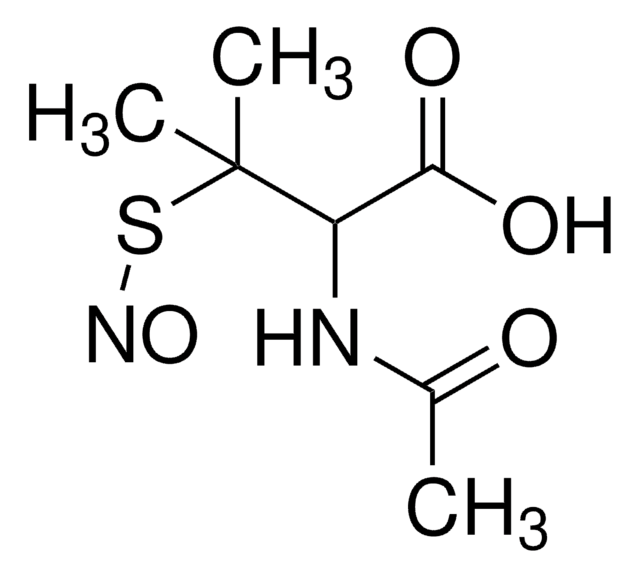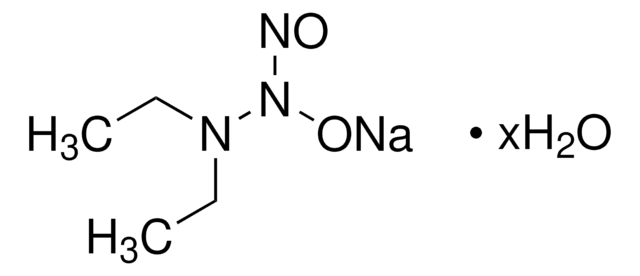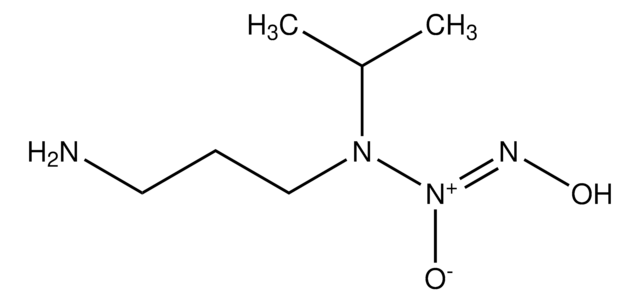E3145
3-Ethyl-3-(ethylaminoethyl)-1-hydroxy-2-oxo-1-triazene
≥90%
Sinônimo(s):
NOC-12
Faça loginpara ver os preços organizacionais e de contrato
About This Item
Fórmula empírica (Notação de Hill):
C6H16N4O2
Número CAS:
Peso molecular:
176.22
Número MDL:
Código UNSPSC:
12352200
ID de substância PubChem:
NACRES:
NA.77
Produtos recomendados
Nível de qualidade
Ensaio
≥90%
temperatura de armazenamento
−20°C
cadeia de caracteres SMILES
CCNCCN(CC)\[N+]([O-])=N\O
InChI
1S/C6H16N4O2/c1-3-7-5-6-9(4-2)10(12)8-11/h7,11H,3-6H2,1-2H3/b10-8-
chave InChI
DPKCLDSTXVCYSN-NTMALXAHSA-N
Descrição geral
3-Ethyl-3-(ethylaminoethyl)-1-hydroxy-2-oxo-1-triazene (NOC12) is a donor of nitric oxide (NO). It has a long half-life of 327 minutes.
Aplicação
3-Ethyl-3-(ethylaminoethyl)-1-hydroxy-2-oxo-1-triazene has been used as nitric oxide (NO) donor to study its effects on the isolated trachea preparations from control and ovalbumin-sensitized guinea pigs in vitro. It has also been used as a NO-releasing substance to study its effects on the body contractions patterns of Tethya wilhelma.
Ações bioquímicas/fisiológicas
3-Ethyl-3-(ethylaminoethyl)-1-hydroxy-2-oxo-1-triazene (NOC12) liberates nitric oxide (NO) without the use of cofactors or enzymes and the formation of hazardous metabolites. A low dose of NOC12 protects astrocytes from reperfusion injury via a cyclic guanosine monophosphate (cGMP) signal. Higher dosages of NOC12 aggravates reperfusion damage through a cyclic guanosine monophosphate (cGMP)-independent mechanism.
Palavra indicadora
Danger
Frases de perigo
Declarações de precaução
Classificações de perigo
Self-react. C
Código de classe de armazenamento
5.2 - Organic peroxides and self-reacting hazardous materials
Classe de risco de água (WGK)
WGK 3
Ponto de fulgor (°F)
Not applicable
Ponto de fulgor (°C)
Not applicable
Equipamento de proteção individual
dust mask type N95 (US), Eyeshields, Gloves
Escolha uma das versões mais recentes:
Já possui este produto?
Encontre a documentação dos produtos que você adquiriu recentemente na biblioteca de documentos.
Ahmet Parlak et al.
Experimental lung research, 38(8), 420-426 (2012-10-04)
Asthma is a chronic inflammatory disease in which cell components play important roles. We aimed to evaluate the effects of NO/cGMP cleavage at trachea preparations isolated from ovalbumin-sensitized guinea pigs in vitro. Trachea rings were exposed to 3-ethyl-3-(ethylaminoethyl)-1-hydroxy-2-oxo-1-triazene (NOC-12), (±)-(E)-4-ethyl-2-[(Z)-hydroxyimino]-5-nitro-3-hexen-1-yl-nicotinamide
Kornelia Ellwanger et al.
Frontiers in zoology, 3, 7-7 (2006-04-29)
Sponges (Porifera) are nerve- and muscleless metazoa, but display coordinated motor reactions. Therefore, they represent a valuable phylum to investigate coordination systems, which evolved in a hypothetical Urmetazoon prior to the central nervous system (CNS) of later metazoa. We have
Kazuhiro Takuma et al.
Japanese journal of pharmacology, 89(1), 64-71 (2002-06-27)
We examined the effect of 3-ethyl-3-(ethylaminoethyl)-1-hydroxy-2-oxo-1-triazene (NOC12), a nitric oxide (NO) donor, on apoptosis in cultured astrocytes. Reperfusion after hydrogen peroxide (H2O2) exposure caused a decrease in cell viability, loss of mitochondrial membrane potential, caspase-3 activation, DNA ladder formation, and
Cristiane Salum et al.
Neurotoxicity research, 29(1), 92-104 (2015-09-24)
Previous research has shown that nitric oxide (NO) synthase inhibitors prevent rodents' sensorimotor gating impairments induced by dopamine releasing drugs, such as amphetamine (Amph) and methylphenidate. The mechanisms of this effect have not been entirely understood. In the present work
Tengfang Ling et al.
The Plant cell, 29(11), 2871-2881 (2017-11-01)
Pathogens deliver effectors into plant cells to suppress immunity-related signaling. However, effector recognition by the host elicits a hypersensitive response (HR) that overcomes the inhibition of host signaling networks, restoring disease resistance. Signaling components are shared between the pathogen-associated molecular
Nossa equipe de cientistas tem experiência em todas as áreas de pesquisa, incluindo Life Sciences, ciência de materiais, síntese química, cromatografia, química analítica e muitas outras.
Entre em contato com a assistência técnica









